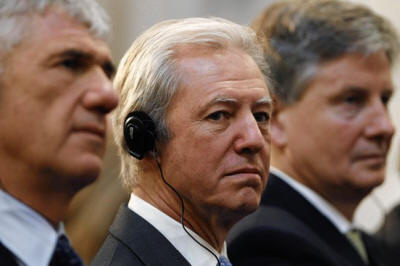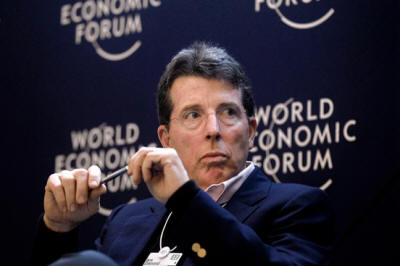
July 2, 2012
from
WashingtonsBlog Website
We noted Friday:
Barclays and other large banks - including
Citigroup, HSBC, J.P. Morgan Chase, Lloyds, Bank of America, UBS, Royal
Bank of Scotland - manipulated the world’s primary interest rate (Libor)
which virtually every adjustable-rate investment globally is pegged to.
***
That means they manipulated a good chunk of the world economy.
We actually understated the impact of
the Libor
scandal.
Specifically, according to the CIA’s World Factbook, the global economy - as
measured by the world’s gross domestic product - is less than $80 trillion.
In contrast, over $800 trillion dollars worth of investments are pegged to
the Libor rate. In other words, a market more than 10 times the size of the
entire real world economy is effected by Libor.
As the Wall Street Journal
reports today:
More than $800 trillion in securities and
loans are linked to the Libor, including $350 trillion in swaps and $10
trillion in loans.
Remember, the derivatives market is
approximately $1,200 trillion dollars. Interest rate derivatives comprise
the lion’s share of all derivatives, and could blow up and take down the
entire financial system.
The largest interest rate derivatives sellers include,
-
Barclays
-
Deutsche
Bank
-
Goldman
-
JP Morgan,
…many of which are being exposed for
manipulating Libor.
They have been manipulating Libor on virtually a daily basis since 2005.
They are still part of the group of banks which sets Libor every day, and
none have been criminally prosecuted.
They have received a light slap on the wrist from regulators, which - as
Nobel economist Joe Stiglitz points out - is just the cost of doing
business when fraud is the business model.
Indeed - as Bloomberg notes - they’re probably still manipulating the rate:
The U.K. bankers and regulators charged with
reviewing Libor in the wake of regulatory probes are resisting calls to
overhaul the rate because structural changes risk invalidating trillions
of dollars of contracts.
The group, established by the British Bankers’ Association in March
after probes into allegations that traders rigged the London interbank
offered rate… won’t propose structural changes such as basing the rate
on actual trades or taking away oversight of the benchmark from the BBA,
the people said.
Libor is determined by a daily poll that asks banks to estimate how much
it would cost them to borrow from each other for different timeframes
and in different currencies. Because banks’ submissions aren’t based on
real trades, academics and lawyers say they are open to manipulation by
traders.
At least a dozen firms are being probed by regulators worldwide
for colluding to rig the rate, the benchmark for $350 trillion of
securities.
“I don’t see a significant enhancement to the reputation of Libor
without basing it on actual transactions,” said Rosa Abrantes-Metz, an
economist with Global Economics Group, a New York-based consultancy, an
associate professor with New York University’s Stern School of Business
and the co-author of a 2008 paper entitled “Libor Manipulation?” [the
manipulation was well-known in England in 2007, Shah Gilani warned of
Libor manipulation in 2008, and Tyler Durden, Max Keiser and others
started sounding the alarm at or around the same time.]
“It would only be disruptive if current quotes are inaccurate,” so
resistance “is suspicious,” she said.
***
Traders interviewed by Bloomberg in March at three firms said they were
given no guidance on how Libor should be set and there were no so-called
Chinese walls preventing contact between the treasury staff charged with
submitting the rate and traders who stood to profit on where Libor was
set each day.
They regularly discussed where Libor would be set with
their colleagues and their counterparts at other firms, they said.
“Sadly the response looks to be very consistent with the response of
policy makers to the banking disasters we’ve seen over the last four
years - cosmetic changes, but nothing substantial happens,” said Richard
Werner, a finance professor at the University of Southampton.
“It’s
insufficient and doesn’t really go to the heart of the problem.”
Barclays's Agius Is Stepping Down
by Sara Schaefer Muñoz and
Max Colchester
July 1, 2012
from
WSJ Website
LONDON
The chairman of Barclays, Marcus Agius,
will step down amid fallout from the bank's $453 million settlement of an
interest-rate manipulation probe, according to three people close to the
bank.
Political and investor pressure has mounted on the management of U.K.-based
Barclays since the settlement was announced Wednesday. The announcement of
Mr. Agius's departure could come as soon as Monday, said one of the people.
Mr. Agius, 65 years old, a British-Maltese banker who formerly worked at
Lazard Ltd, has led the bank since 2007, steering Barclays through the 2008
financial crisis and avoiding the direct state bailouts that were needed by
many of its global peers.
But Barclays has faced a number of problems more recently, including a
sweeping investigation by U.S., U.K. and Asian authorities of several global
banks into alleged wrongdoing in the interest-rate-setting process that
influences a benchmark lending rate, the London Interbank Offered Rate, or
Libor.

Reuters
Marcus Agius is expected to resign as Barclays chairman on Monday.
Barclays was the first among a group of global
banks being investigated to reach a settlement. No banks or individuals have
been charged with wrongdoing.
Banks that have disclosed they are being investigated include,
...has said it has been granted partial
immunity by certain regulators, including the Justice Department, in return
for cooperating with the probe.
In the settlement with the U.K.'s Financial Services Authority, the U.S.
Commodity Futures Trading Commission and the U.S. Department of Justice's
fraud section, Barclays admitted that executives and traders tried to
manipulate this interest rate.
Libor rates are calculated for different currencies each day under the
auspices of the British Bankers' Association using quotes submitted by banks
on a panel, based on the banks' estimated borrowing costs.
More than $800 trillion in securities and loans
are linked to the Libor, including $350 trillion in swaps and $10 trillion
in loans, including auto and home loans, according to the CFTC. Even small
movements - or inaccuracies - in Libor affect investment returns and
borrowing costs, for individuals, companies and professional investors.
The settlement comes as investors in recent quarters have become displeased
with the bank's high pay for its executives and its low returns, especially
after an ambitious effort to expand its investment bank fell short of
expectations. Along with other U.K. banks, it has been involved in the
widespread mis-selling of payment-protection insurance.
The bank also has been accused by U.K. authorities of avoiding tax, a
misdemeanor that could cost it £500 million ($785.2 million). Barclays said
it hasn't done anything wrong.
In addition to likely costing Mr. Agius his job, the Libor settlement put
the bank's chief executive, Robert Diamond, in the spotlight, with
speculation last week that the scandal could force him to be the one to step
down. But Mr. Diamond, 60, appears to have dodged that bullet.
Mr. Diamond and other top executives met last week with Barclays board, and
agreed to forgo their multi-million pound bonuses in hopes of blunting
criticism of the bank's actions.
But the bonus sacrifice didn't satisfy politicians and some shareholders,
and Prime Minister David Cameron vowed to launch an independent
investigation on how the rate is set.
"It's very important [the review] takes all
of the actions necessary, holding bankers accountable... making sure
there's proper transparency, making sure the criminal law can go
wherever it needs to uncover wrongdoing," he told BBC television
Saturday.
Labour opposition leader Ed Miliband called for
a criminal prosecution relating to the attempted rate-manipulation, and Mr.
Diamond will appear before a Parliamentary panel to answer questions.

Bloomberg News
Barclays Chief Executive Robert Diamond seems to have dodged bullet.
Mr. Agius is at the center of the Libor scandal,
acting as both chairman of Barclays and the BBA, the trade body the oversees
the benchmark.
He has been a divisive figure at the BBA, clashing with Chief Executive
Angela Knight, according to people familiar with the matter. Ms. Knight
has been pushing for the government to have a greater oversight of the
benchmark, but has faced internal resistance, these people say.
The U.K. government, along with the Financial Services Authority and the
Bank of England, has been reviewing the regulation and supervision of Libor
since March of this year.
Business Secretary Vince Cable said there should also be a criminal
investigation into the Libor-fixing scandal.
"[The public] just can't understand why
people are thrown into jail for petty theft and these guys just walk
away having perpetrated what looks like conspiracy," Mr. Cable told Sky
television Sunday.
Bank of England Gov. Mervyn King on
Friday called for the current system for calculating Libor to be scrapped.
Mr. King said the process of using quotes to calculate Libor should be
replaced with a system in which actual transaction prices are used instead.
"The idea that my word is my Libor is dead," he said.
In the settlement agreement,
the CFTC said there were two areas of unlawful
conduct by Barclays.
The first concerned senior management, the regulator
said. In late 2007, as banks came under pressure in the early rumblings of
the financial crisis, Barclays managers didn't want the bank to be seen to
be paying high rates to borrow, it said.
After discussions "among high levels of
management" within the bank, an order was sent to keep Barclays' submissions
to U.S. dollar Libor at an artificially low level, the CFTC said.
"Barclays Libor submitters were told not to
submit [quotes for U.S. Libor] at levels where Barclays was 'sticking
its head above the parapet,'" the CFTC said.
"Multiple" senior managers at the bank were
involved, according to a CFTC official.
People familiar with the matter
say the majority of Barclays employees involved in the alleged
manipulation have left the bank.
The CFTC also said Barclays traders in New York, London and Tokyo
attempted to manipulate Libor to help their derivatives trading
positions. Traders made unlawful requests to the bank's rate submitters
"routinely, and sometimes daily" from at least mid-2005 to at least the
fall of 2007, the CFTC said.
The requests were frequently accepted by the
bank's rate submitters, according to the CFTC.
It quoted emails such as,
"always happy to help" and "Done... for you big boy."
Note: A version of this article appeared July 2, 2012,
on page C1 in the U.S. edition of The Wall Street Journal, with the
headline:
Barclays Fallout Hits Chairman.


